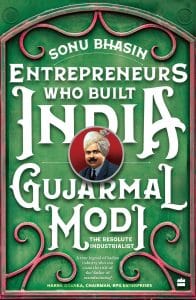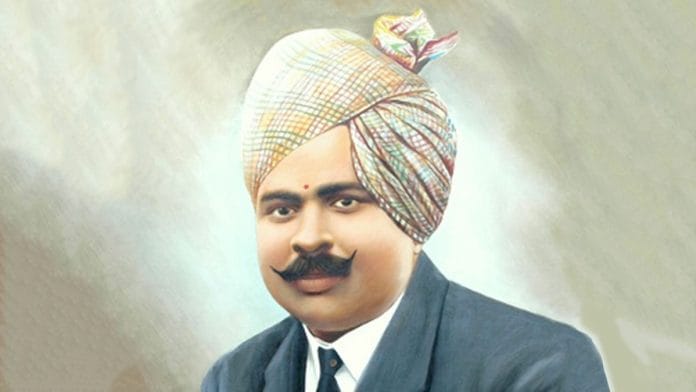I find it an irony of fate that Gujarmal Modi—founder of India’s seventh-largest business empire in the 1960s—is today better known as the grandfather of Lalit Modi—the one of IPL fame. From being called a ‘dirty Indian’ by an Englishman in pre-Independence India to being banished from the princely state of Patiala; from setting up some of the finest factories in pre-Independence India to being coerced to follow the Indian government’s diktat—Gujarmal Modi saw it all. But he was undaunted in his endeavour to set up some of the best and largest industries in India. Starting off with a single sugar mill in 1934, Gujarmal Modi, almost single-handedly, expanded his business to become one of the biggest industrialists in India by the 1960s. After his death in 1976, the business empire fell apart but even today, some of the industries set up by him and his inheritors survive and are worth over $2 billion collectively.
Gujarmal Modi and the Modi Group are not a lone example of thriving business empires set up in pre-Independence India that grew in stature and size in the following years and then lost their way as they were hit either by family feuds or liberalization or both. The Indian industrial and corporate sectors are scattered with people and businesses who lost their way after they saw their glory peak in the days that some consider being the most challenging in the lives of Indian businessmen—the years between 1947 and 1991.
India became independent in 1947 and the new-found freedom brought forth aspirations and dreams for not just individuals, but also collective dreams of social, political and economic freedom. However, the first prime minister envisaged a developmental model that had the state playing a dominant role as an entrepreneur as well as the funder of private businesses. The dreams of the economic freedom that entrepreneurs had dreamt of in the new India quickly withered away as the British Raj was replaced by the Licence Raj.
Due to the restrictions placed by the Licence Raj, which many say was a complex and opaque system, being an entrepreneur in India was a big headache. Further, the entrepreneurial spirit was kept on a tight leash by the complex and authoritative system. Entrepreneurs were successful not so much because of what they did but because of who they knew. Such was the dependence on the benign hand of the government that businessmen, due to their association with politicians and bureaucrats, were also enveloped in the cloud of corruption in the minds of the general public.
Also read: Gujarmal Modi: The sugar baron British celebrated on Meerut roads
However, people forget that there were many entrepreneurs, and indeed businesses, during those particularly challenging times that worked tirelessly to make the new India. Gujarmal Modi was one of them. It certainly was not easy, but he persevered.
As an entrepreneur during the British rule, Gujarmal Modi faced problems around transport, logistics, communication and even skilled talent. The transport of most materials and supplies was on slow-moving carts or using the very few motor vehicles available. Getting in touch with mills and factories in remote locations was tough. Most machineries had to be imported and then it was a challenge to find workers to run the machines. There were no MBA institutes to churn out batches of management students who could run businesses; most entrepreneurs relied on family members to run the various businesses.
Some of these challenges persisted in independent India while some fresh ones were added. These new challenges primarily revolved around the new ‘system’ of doing business in independent India. True, Gujarmal Modi did learn how to ‘manage’ the system, but it required entrepreneurial skills to set up, manage and grow the businesses within the tight framework of the system. Manufacturing is never an easy business and the Licence Raj made achieving economies of scale even more difficult with the restrictions on the numbers that could be produced. It is to the credit of Gujarmal Modi that he not only went about his work diligently but also created products that became household names at that time. Unfortunately, most of those are present today either in a diluted form or are almost forgotten.
However, what cannot and should not be forgotten is Gujarmal Modi’s contribution in being part of a group of entrepreneurs who worked to lay down the foundations of the Indian economy and industry. If it were not for him and other stalwarts who worked against the odds and set up businesses, provided employment to many people and kept the Indian economy growing, the India of today would not be where she is currently.
Thus, it is important to bring these entrepreneurs out of their obscurity and present them to the new generation as the entrepreneurs who made India.
This is the story of Gujarmal Modi, the founder of the Modi Group, which grew to be a large and diversified business empire by the late 1960s. It was a group with interests in sugar, steel, oil, vanaspati, tyres, nylon thread, yarn, lanterns, soaps and dehydrated food, among others. The story of Gujarmal Modi is not that of rags to riches; it is a story of a single man’s determination to set up an industrial township of his own.
Gujarmal Modi came from a wealthy family—a family of businessmen who made their money by supplying goods to the British Army. Gujarmal was the eldest son of the family and could have taken the easy way out by managing his father’s business. However, entrepreneurship and ambition burnt bright in young Gujarmal Modi, and he wanted to break out from under his father’s shadow and establish businesses of his own.
Most entrepreneurs, when they start their entrepreneurial journey, have a vision of establishing a group of thriving businesses. Gujarmal Modi was different. When he started his independent entrepreneurial journey in 1933 with `300 in his pocket, his vision was to establish an industrial township. A thriving township with mills, factories, housing colonies for the workers, educational institutes, hospitals, shops and markets, temples and gardens.
 This excerpt from ‘Gujarmal Modi: The Resolute Industrialist’ by Sonu Bhasin has ben published with permission from HarperCollins.
This excerpt from ‘Gujarmal Modi: The Resolute Industrialist’ by Sonu Bhasin has ben published with permission from HarperCollins.






